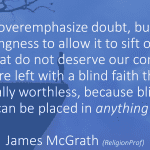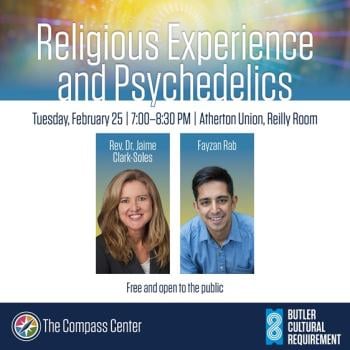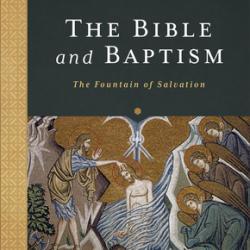Scot McKnight posted about infant baptism, which is apparently the subject of his new book, It Takes a Church to Baptize. In a series of upcoming blog posts he will talk about how and why he has shifted away from believer’s baptism to favoring infant baptism.
I happen to have been baptized twice, which gives me an interesting perspective on this topic. The first time was as an infant in a Roman Catholic church, and the second was as a teenager in a Pentecostal church. I grew up in the former but drifted away, and then after having a born again experience, I became persuaded that baptism ought to reflect a personal decision and so underwent a believer’s baptism.
I appreciate Scot’s analogy to citizenship – in a post from more than a decade ago on “Why I Am a Christian,” I use the analogy myself. But is faith more like citizenship or like marriage (as understood in most of the English-speaking world), something where the default is presence or absence? Of course, one can always renounce citizenship, and one can arrange marriages from infancy. This is a question about the “default setting,” as it were.
Those who object to infant baptism often do so based on how they perceive it detracting from the individual’s freedom to choose their own religious path. For some, this is just a desire to see the absence of religiosity become the default position. For others, the emphasis is on personal commitment as opposed to nominalism.
What is often missed in discussions of this topic is the fact that baptists broadly defined (i.e. those denominations that subscribe to believer’s baptism) must put more effort into cultivating commitment on the part of the individual. It is doubtful that extensive Vacation Bible School, Sunday School, camps, clubs, and other aspects typical of Evangelicalism in particular constrain an individual’s choice less than say infant baptism (accompanied in many instances by a merely formal mouthing of a commitment to foster faith by parents and godparents) and mere church attendance.
There is no way that a human being will fail to be influenced and to some extent constrained by our upbringing, whatever form it takes. That isn’t an argument for either approach to be baptism. But it is making a point relevant to both those who prefer to baptize infants and those who leave it for a later personal decision. There is no sense in which one approach or the other either leaves the matter entirely in the hands of the adult individual or places the decision firmly in the hands of family and community. Baptists and Catholics, agnostics and atheists too, all seek to instill their values in their children – whether those values be “stay true to our tradition” or “make up your own mind when you are old enough.” Both approaches are found among the religious and the non-religious alike.
What are your views on baptism and religious upbringing? What has your own experience been, and how does it relate to this topic?













